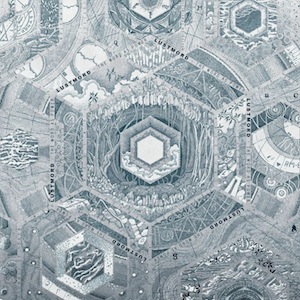Dark ambient has rarely impressed me as a genre, with each release tagged under the style merely seeming to be engaged in a tiresome battle to outdo other releases in the massive bleakness stakes, but without the dynamism and aggression of other "dark" genres such as doom metal or noise. But, if anyone has put forward dark ambient as a relevant and significant genre, it’s Brian Williams, aka Lustmord. Over the years, he has racked up an impressive tally of critically-praised albums, with 1995’s joint album with Robert Rich, Stalker, a notable high point.
The Word As Power is one of the boldest steps forward in Lustmord’s entire canon, focusing as it does on the human voice over the usual dark ambient tropes such as synthesizers and guitars. Each track on the album seems like a capsule of time and atmosphere that lingers outside of actual time and space, existing in its own universe where the boundaries of language are surreptitiously blurred and the songs that ensue and imbued with a beautiful sense of mystery.
It helps that Williams has brought together a stellar cast of vocalists, including Tool’s Maynard James Keenan and Jarboe, formerly of Swans. In the capable hands of these singers, the songs, be they wordless mantras or incantatory half-chants, are given a potency bordering on the sacred, although this is a religious fervour steeped in oblique, shady paganism. I can imagine Julian Cope or Genesis P-Orridge digging The Word As Power. With the vocals given centre stage, the music of Lustmord is elevated beyond mere "darkness" and is offered as something transcendental or deeply meaningful, the clear, crystalline simplicity of the compositions belying the length of time – five years – it took Williams to create this work.
In this context, it takes a while for the musical force behind The Word As Power to sink in, as it is easy to get absorbed into the layered voices and hear nothing else. But Williams works well within the parameters set by focusing on vocals, allowing them to billow, even soar, by sketching out a musical background as emphatic as it is unobtrusive. The first two tracks, ‘Babel’ and ‘Goetia’ centre on the voices, both sounding like more sinister takes on The Bulgarian Voices and Tuvan throat singing, evoking the timeless melancholy of Angelite and Huun Huur-Tu’s Fly, Fly My Sadness, only recorded in an underground cave.
The abstract vocalisations reverberate and double up on themselves, surrounded by murky sub-bass and almost imperceptible electronics. On the lengthy ‘Chorazin’, however, Williams makes his presence more palpable, with grim, slow-moving electronic textures and subdued rumbles cushioning the mournful vocals in layers of malignant drone. You could imagine any of these seven tracks serving as the soundtrack to an atmospheric horror film, one where the anchors of modern life are ripped away from the protagonists, leaving them untethered in a world as alien as it is terrifying.
Lustmord’s music takes its time, but it’s hard not to get absorbed into its shadowy netherworld, even if all meaning and sense in there stay resolutely out of focus.


